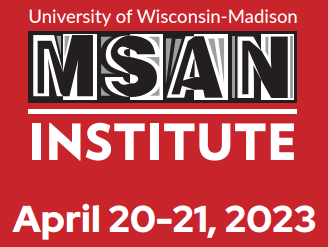U.S. Educators Met in Madison for MSAN Institute Focused on Educator Shortage
Two-day conference starting April 20 was first in-person MSAN Institute since 2019
April 24, 2023 | By WCER Communications

WCER’s MSAN Network hosted 175 teachers, principals, and school district leaders from across the country last week for the 2023 MSAN Institute, a two-day professional learning conference aimed at building racially just schools, with a focus this year on addressing the educator shortage crisis while recruiting and retaining a diverse workforce.
On April 20–21 at the Madison Concourse Hotel, the program offered attendees a series of breakout sessions, job-alike networking groups, and a keynote address. As in years past, a conference highlight was the presentation from a panel of high school students who are equity leaders in their schools, moderated this year by Antonio Hoye, a student and family engagement specialist from Middleton High School.
Breakout sessions with a local bent included a look at UW−Madison’s Discussion Project, the story of how the Monona Grove Parent Equity Council started in 2018 and its impact on the school community, and an examination of staff recruitment and retention trends in the Madison Metropolitan School District, with the sharing of one promising district practice to increase teacher morale developed with two MMSD elementary schools over the last 10 months.
Now in its 24th year, MSAN is a national coalition of 27 multiracial school districts working together to understand and eliminate racial opportunity gaps that persist in schools. As a network of equity-focused districts, MSAN shares best practices, analyzes policies, and engages in professional development opportunities, such as the annual MSAN Institute.
With its national home at UW−Madison, member districts hail mainly from the East Coast, including New Jersey, Massachusetts, Virginia, and North Carolina, and the Midwest: Michigan, Illinois, Ohio, and Wisconsin. Wisconsin districts include Madison, Middleton-Cross Plains, Sun Prairie, Stevens Point, and Waunakee. MSAN also has two Phoenix-area districts in Arizona.
Members met in person for the Institute conference in April 2023 for the first time since 2019. (Conferences were held online in 2021 and 2022—and it was canceled in 2020—due to the pandemic.)

Latoya Holiday
“We’re extremely excited to be in-person for the MSAN Institute this year,” said MSAN Interim Executive Director Latoya Holiday. “Professional development and continuous learning is essential for educational leaders and practitioners to find new ways to meet the varying needs of our students. The MSAN Institute provides a unique opportunity for all committed to our students to learn and grow together in service to the advancement of equity and opportunity. We have an excellent slate of presenters and keynotes and are sure all participants will leave informed and inspired to continue working on behalf of all students.”
MSAN is housed in the School of Education’s Wisconsin Center for Education Research (WCER) and is led by a governing board of superintendents from the member districts, which work collaboratively to analyze policies and share promising practices, with a shared goal of advancing equity and expanding access for the most underserved students. Its work is never done.
“Unfortunately, significant numbers of our students and families continue to face challenges and barriers in our schools and communities,” Holiday said. “We all strive daily to identify new and evidence-based ways to overcome these challenges and eliminate all barriers preventing student success.”
Conference attendees learned about current research and promising practices to create more equitable educational environments. Across the 19 sessions provided, participants had opportunities to:
- Hear educators describe programs to improve student opportunity and achievement.
- Take part in large and small group discussions with educators doing this work.
- Network with others across the country in the job-alike session.

Dr. Phelton Moss
Keynote speaker at this year’s conference was Dr. Phelton Moss, a senior professorial lecturer of education policy & leadership at American University. Moss was to speak to MSAN’s focus for this year with a kick-off address titled, “Building Racially Just Schools: Addressing Salient Issues Facing Students Who Have Been Racially Minoritized. Special guests from UW−Madison’s School of Education (SoE) also were to provide remarks, including Dr. Percival Matthews, associate dean of the school’s Office of Equity, Diversity, and Inclusion, and SoE Dean Dr. Diana Hess.
Topics for breakout sessions over the two days included ways educational leaders can respond to racist, anti-Black rhetoric and the role of student voice in developing equitable learning environments.
Additionally, a “Grow Your Own” program employed to diversify and advance work staff in the Sun Prairie Area School District was explained in a session, and Dr. Silvia Romero-Johnson, assistant superintendent of the Middleton-Cross Plains Area School District, was to present a session about advancing educational equity for multilingual learners using dual language programs. Also from Middleton-Cross Plains, Deputy Superintendent Dr. Sherri S. Cyra in a separate session presented the results of a study that investigated the impact of anti-racist professional development on white educators in predominantly white suburban staff districts.
Additional breakout sessions presented by educators from other parts of country were to cover topics including hiring, supporting, and retaining teachers of color, identifying and serving gifted learners with an inclusive approach, the idea of “getting in good trouble” at school, and strategies to prevent teacher burnout.


